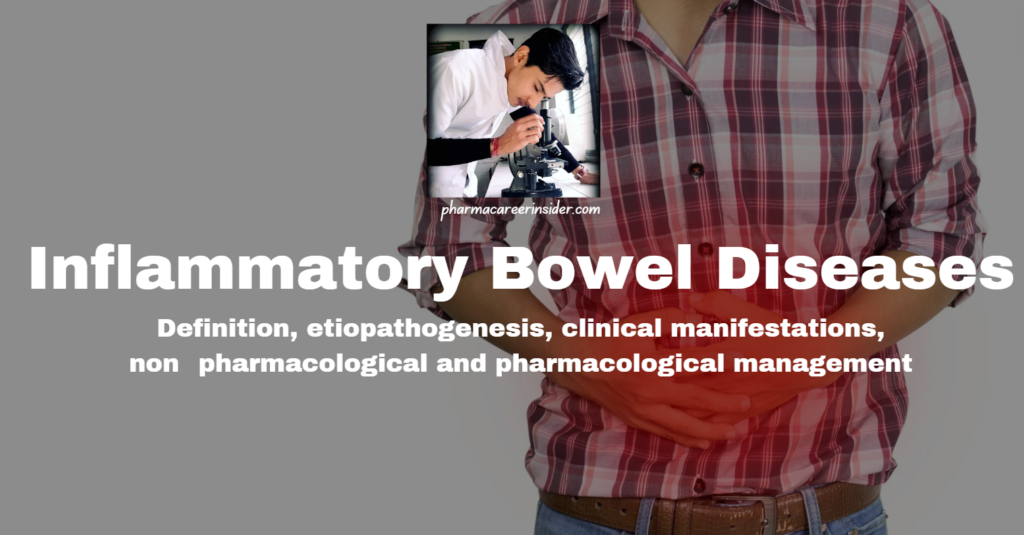Inflammatory Bowel Diseases (IBD) are chronic inflammatory conditions of the gastrointestinal tract, characterized by periods of flare-ups and remissions. The two main types of IBD are Crohn’s disease (CD) and ulcerative colitis (UC). These conditions involve complex interactions between genetic, environmental, and immunologic factors.
Etiopathogenesis
1. Genetic Factors:
There is a genetic predisposition to IBD, and certain genes may increase susceptibility.
Family history of IBD is a risk factor.
2. Immunologic Factors:
Dysregulation of the immune system plays a significant role in IBD.
The immune system mistakenly attacks the intestinal lining, leading to inflammation.
3. Environmental Factors:
Environmental factors, such as infections, diet, and smoking, may contribute to the development or exacerbation of IBD.
4. Microbiota:
Alterations in the gut microbiota may play a role in triggering and sustaining inflammation in IBD.
5. Immune Response:
Abnormal immune responses, including an exaggerated inflammatory response, contribute to tissue damage in the gastrointestinal tract.
6. Mucosal Barrier Dysfunction:
Impaired integrity of the mucosal barrier allows antigens and bacteria to penetrate, triggering an inflammatory response.
Clinical Manifestations
1. Crohn’s Disease (CD):
Can affect any part of the gastrointestinal tract, from the mouth to the anus.
Common symptoms include abdominal pain, diarrhea, weight loss, fatigue, and sometimes perianal involvement.
Extraintestinal manifestations may include joint pain, skin rashes, and eye inflammation.
2. Ulcerative Colitis (UC):
Primarily affects the colon and rectum.
Symptoms include bloody diarrhea, abdominal pain, urgency, and tenesmus (feeling the need to evacuate even with an empty bowel).
Systemic symptoms may include fatigue, weight loss, and fever.
Non-Pharmacological Management
1. Dietary Modifications:
Some individuals with IBD may benefit from dietary modifications, such as a low-residue diet during flares.
Specific carbohydrate diets or exclusion diets may be considered under medical supervision.
2. Nutritional Support:
In severe cases, nutritional support or enteral feeding may be required to manage malnutrition or support growth in children.
3. Lifestyle Modifications:
Stress management and regular exercise may help in symptom management.
4. Smoking Cessation:
Smoking is a significant risk factor for Crohn’s disease, and cessation may improve outcomes.
Pharmacological Management
1. Anti-Inflammatory Medications:
Aminosalicylates: Used for mild to moderate inflammation in UC and some cases of CD.
Corticosteroids: Short-term use during flares to induce remission; long-term use is avoided due to side effects.
2. Immunosuppressants:
Immunomodulators: Azathioprine, 6-mercaptopurine, or methotrexate to control inflammation.
Biologics: Target specific pathways in the immune system (e.g., anti-TNF agents like infliximab, adalimumab).
3. Anti-diarrheal Medications:
Used to control diarrhea, particularly in cases of IBD-associated irritable bowel syndrome (IBS).
4. Antibiotics:
Sometimes used for specific complications or infections associated with IBD.
5. Symptomatic Treatment:
Medications to manage symptoms such as pain relievers and antispasmodics.
6. Supportive Therapy:
Supplemental vitamins and minerals to address deficiencies.
7. Surgery:
In cases of severe complications or refractory disease, surgical intervention may be necessary (e.g., bowel resection, colectomy).
Management of IBD is individualized and may involve a combination of medications based on the type, severity, and location of the disease. Regular follow-up with healthcare providers, including gastroenterologists, is essential for monitoring disease activity, adjusting treatment plans, and addressing complications.



